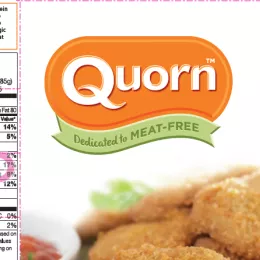Chemical Cuisine Rating
Certain people should avoid
Purpose: Meat substitute
Health Concerns: Allergies & sensitivities, digestive
Found in: Quorn brand foods
Mycoprotein, the novel ingredient in Quorn-brand frozen meat substitutes, is made from processed mold (Fusarium venenatum) and can cause serious reactions in some people. Until recently, manufacturer Marlow Foods’ advertising and labeling implied that the product is "mushroom protein" or "mushroom in origin," although the mold (or fungus) from which it is made does not produce mushrooms. Rather, the mold is grown in liquid solution in large tanks. Quorn foods have been sold in the United Kingdom since the 1990s and also in continental Europe. Quorn foods have been marketed in the United States since 2002 and in Scandinavia, Australia, and New Zealand more recently. The chunks of imitation meat are nutritious, but the prepared foods in which they are used may be high in fat or salt.
Typical adverse reactions are to Quorn products are vomiting, nausea, and diarrhea. Hives, breathing difficulties, and potentially fatal anaphylactic reactions are less common. Many people have gone to emergency rooms for treatment of Quorn-related reactions. In 2013, an 11-year-old boy who had asthma died after eating a Quorn Turk’y Burger.
The British and American governments acknowledge that people are allergic or intolerant to Quorn foods, but so far have rejected CSPI's recommendations to require Quorn foods to bear a label warning of possible severe adverse reactions. (In fact, when Quorn-containing "vegetarian" products are served at restaurants, cafeterias, and other foodservice locations, there may not even be a label to inform consumers that they are eating Quorn foods.)
However, in 2017, because of an objection that CSPI filed in response to a proposed settlement of a class action case accusing Quorn’s manufacturer of deceptive marketing, the manufacturer agreed to modify its labeling. Labels for all Quorn products sold in the United States now must state “Mycoprotein is a mold [member of the fungi family]. There have been rare cases of allergic reactions to products that contain mycoprotein.”
In 2018, CSPI published an analysis of over 2,000 reports to CSPI. It concluded that more people suffered from sometimes severe GI reactions (nausea, vomiting, diarrhea, abdominal cramps) than allergic reactions (hives, itchy skin, swelling of the throat or mouth area, breathing difficulties), and that some people experienced both.
Back to Chemical Cuisine










